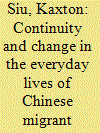| Srl | Item |
| 1 |
ID:
139847


|
|
|
|
|
| Summary/Abstract |
How have Chinese migrant workers’ patterns of everyday life changed over the past two decades, and what has not changed? Have their personal and career aspirations shifted over time? What changes have occurred in how they maintain social relationships within and across factories? What are the implications for migrant workers, local governance and factory managements? Based on workers’ letters and ethnographic research in Shenzhen, this article argues that migrant workers encounter very different circumstances today in their housing, food, time scheduling, aspirations and ways of maintaining social relationships. yet young migrant workers still invoke social relationships steeped in links to family and village to cope with daily difficulties. I examine the workers’ greater control over their time, local governments’ growing need to accommodate migrant workers’ requirements in order to maintain social stability, and the increasing pressure on factory managements to consider workers’ work/leisure arrangements, especially during peak industrial seasons.
|
|
|
|
|
|
|
|
|
|
|
|
|
|
|
|
| 2 |
ID:
167247


|
|
|
|
|
| Summary/Abstract |
Sri Lankan apparel factories claim to be at the vanguard of ethical production on the global supply chain. Both to produce this image and to project their status as fair employers, industrialists offer health services at factory settings. This article focuses on two factory sites that have permanent qualified nurses to attend to illness and injuries, and medical doctors that visit twice a week. While on the face of it, these efforts are commendable, what my fieldwork signalled was that occupational health issues were inseparable from the creeping privatization of health care systems. Injuries or illnesses not treated within a ‘reasonable’ time frame were invariably referred to the private clinics of medical doctors. Ironically, this pattern is bolstered by the proliferation of what one worker described as ‘imaginary’ illnesses – that is, illnesses that workers concoct as a form of respite from the intense pressures of working in this sector. In this paper, I examine the ways in which workers get treated and how it is connected to an increasingly unregulated privatized landscape of healthcare. These shifts also show how the perspectives of citizenry change, despite the social welfare achievements around health and longevity of Sri Lankans.
|
|
|
|
|
|
|
|
|
|
|
|
|
|
|
|